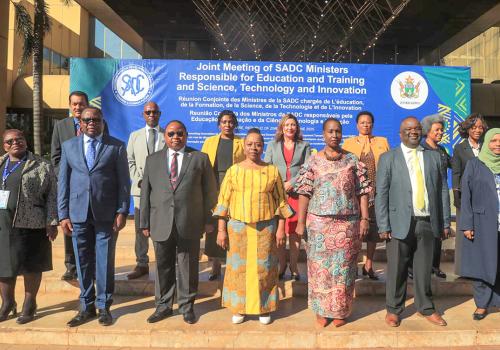Ministers from the Southern African Development Community (SADC) have emphasised the urgent need to enhance education systems across the region to support socio-economic growth, industrialization and regional integration.
These calls were made during the Joint Meeting of SADC Ministers Responsible for Education and Training, and Science, Technology and Innovation, held in Harare, Zimbabwe, on 20 June 2025. The Joint Committee of Ministers, a statutory SADC body, oversees the implementation of policies and programmes aimed at promoting access to quality education and training, as well as developing a skilled workforce.
The Ministers emphasised the importance of a comprehensive and coordinated approach to education and training and Science, Technology and Innovation. They underscored the importance of digital transformation, partnerships, collaboration, and the advancement of Science, Technology, Engineering, and Mathematics (STEM) education, with a particular focus on increasing participation among women and girls.
The SADC Protocol on Education and Training serves as the principal framework for policy implementation in Education and Training, and Science, Technology and Innovation and plays a crucial role in advancing the SADC Industrialization Strategy, particularly in promoting the development of value chains within sectors such as agro-processing, mineral beneficiation and pharmaceutical manufacturing.
Honourable Dr. Fredrick Shava, Minister of Higher and Tertiary Education, Innovation, Science and Technology Development of Zimbabwe and Chairperson of the Joint Meeting, reaffirmed that education is fundamental to innovation and industrial progress. He noted its critical role in providing the knowledge and skills necessary to develop and manage key economic sectors.
“Education and innovation systems must be aligned with the objectives of regional integration, economic growth, social development, and good governance,” stated Hon. Dr. Shava. He urged Member States to prioritise investment across all education levels, including basic education, higher education, and Technical and Vocational Education and Training (TVET), to ensure a sustainable and prosperous future. He highlighted foundational literacy and numeracy, as well as heritage-based learning, as essential components of life-long skills development.
Mrs. Angele Makombo N’tumba, SADC Deputy Executive Secretary responsible for Regional Integration, emphasised that both the SADC Vision 2050 and the Regional Indicative Strategic Development Plan (RISDP) 2020–2030 position education, training, science, technology, and innovation as central pillars for achieving regional integration and socio-economic transformation. She cited various national and regional initiatives designed to reduce poverty and inequality by equipping citizens with relevant, future-oriented skills to stimulate entrepreneurship and job creation.
Despite ongoing efforts, Mrs. Makombo N’tumba acknowledged that SADC Member States face challenges in meeting the target of investing 1% of GDP in Research and Development. Nonetheless, she praised partnerships, such as with the World Bank, for providing technical support to strengthen institutional capacity in producing Science, Technology and Innovation (STI) indicators.
The Ministers reviewed key policies and regulatory frameworks and considered progress in the implemention of programmes within the education, training, and STI sectors.
A Ministerial High-Level Roundtable on Foundational Literacy and Numeracy was held alongside the meeting. This forum offered Member States an opportunity for strategic dialogue, experience sharing, and exchange of best practices to improve foundational skills in reading, writing, and mathematics.
The Republic of Zimbabwe seized the opportunity to sign the Women in Science, Engineering, and Technology (WISETO) Charter, increasing the number of signatory Member States to twelve (12). This milestone underscores SADC’s dedication to empowering women and girls to pursue careers in STEM fields.
The meeting reaffirmed SADC’s commitment to fostering a knowledge-based economy by empowering citizens through inclusive education and innovation, thereby driving sustainable socio-economic development throughout the region.
The Joint Ministerial meeting was attended by International Cooperating Partners, including the African Development Bank, the Regional Universities Forum for Capacity Building in Agriculture (RUFORUM), OBREAL, the Technological Higher Education Network South Africa (THENSA), the Bill and Melinda Gates Foundation, UNICEF, and UNESCO.

